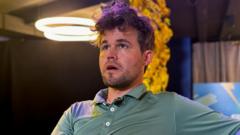The tournament format involved a seven-week long series where teams from around the globe competed in 25 different games, ranging from Call of Duty to League of Legends. As chess made its debut in this multi-discipline competition, the organizers touted it as a step forward for the 139-year-old game, aimed at attracting new audiences and modern engagement.
During the event, players competed in front of a live crowd while wearing heart-rate monitors—a setup reminiscent of traditional sports events. Carlsen outperformed several grandmasters during the group stages, eventually defeating the eighth-ranked Alireza Firouzja to seize the title. Known for embracing contemporary changes in chess, Carlsen previously made headlines when he reinstated participation in major competitions after the chess governing body modified its dress code.
"It's been an incredible show, unlike anything I've experienced so far," Carlsen said after receiving the EWC trophy, a gold-colored plate. He expressed enthusiasm about the future of chess within esports, indicating that this could be a transformative moment for the game's representation on larger platforms.
During the event, players competed in front of a live crowd while wearing heart-rate monitors—a setup reminiscent of traditional sports events. Carlsen outperformed several grandmasters during the group stages, eventually defeating the eighth-ranked Alireza Firouzja to seize the title. Known for embracing contemporary changes in chess, Carlsen previously made headlines when he reinstated participation in major competitions after the chess governing body modified its dress code.
"It's been an incredible show, unlike anything I've experienced so far," Carlsen said after receiving the EWC trophy, a gold-colored plate. He expressed enthusiasm about the future of chess within esports, indicating that this could be a transformative moment for the game's representation on larger platforms.
















